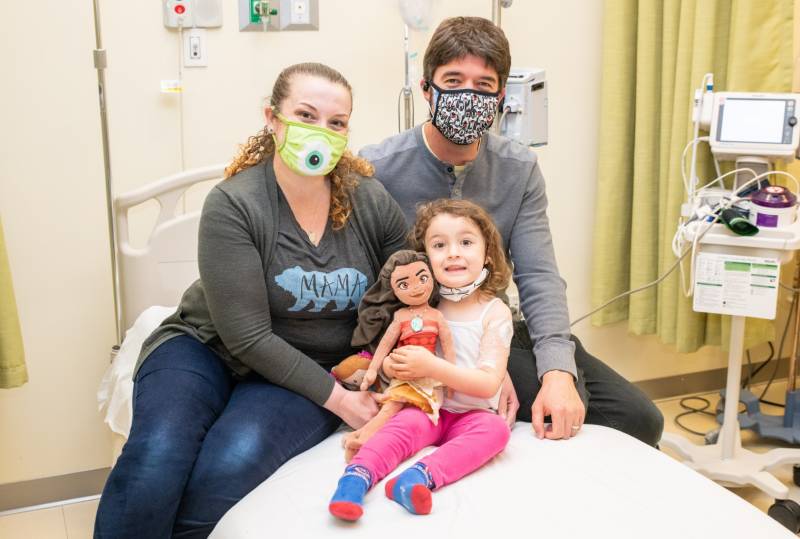“Look at you brave kid,” beams her mom.
The next day, Eloise has yet to complain of any side effects — not even an ouch in her arm where the needle went in.
While an unfortunate number of people are still hesitating about the remarkably effective vaccines, let alone enrolling their kids in clinical trials, Angelica LaCour speaks of the importance of getting children inoculated.
“I think it’s just really important to highlight that we’re not going to get to herd immunity as a country if children are not vaccinated,” she said. “We don’t know the long-term impacts of the virus. And we know that this is a well-tolerated vaccine that’s saving people’s lives. And it’s important that our children get that as well. ”
Still, the family was initially nervous about enrolling their only daughter in the early trial. But they’ weren’t sure they’d be any less so in six months, a year, or whenever the official rollout of vaccines for the youngest Americans takes place.
And while Eloise is healthy, “We know that there’s a lot of other families with kids with vulnerabilities where COVID is potentially life-threatening,” LaCour said. “And so being part of making this a reality for those families is something that is really meaningful to us.”
Second Dose
After three weeks it’s time for Eloise’s second poke. She has decided to dress up as her favorite character from the Pixar movie “Brave.” This time, she squirms a little more but still doesn’t cry.
That night she complains her head hurts a little and that her arm is sore. Nothing that can’t be solved with a low dose of Tylenol, says her mom. Otherwise she’s running around
“Lots of energy,” LaCour says.
Now, a couple of days before her father has gotten his second shot, Eloise is one of a small number of children in the country to be fully vaccinated.
Soon the family will start planning a summer vacation.
Stanford scientists will track Eloise for the next two years to make sure all goes well. The next phases will involve enrolling many more children, eventually thousands, to study accurate dosage, vaccine safety, immune response and efficacy.
Kids Rollout Could Begin Next Fall
Pfizer is planning to apply to the Food and Drug Administration in September for emergency authorization of the vaccine for children age 2 to 11. Meanwhile, the company is expected to receive permission any day now to vaccinate 12- to 15-year-olds. Moderna is also conducting clinical trials in kids for its vaccine.
This science would not be possible without children and parents who are willing to go first, which is why Dr. Yvonne Maldonado, a pediatric infectious disease expert at Stanford Medicine who is leading the trial, lauds the family’s courage.
“If we didn’t have clinical trials, we’d have zero vaccines for children,” she said. “And we save 3 million lives a year from death due to vaccine-preventable diseases as well.”
Last week the Kaiser Family Foundation released a survey showing fewer than a third of parents reporting plans to get their kids COVID shots as soon as it’s possible. Another 32% said they would “wait and see.”
Health officials hope the hesitation eases over time, as it did for adult vaccines. The current survey percentages are similar to what U.S. adults expressed in a KFF September survey, in which 34% of adults said they would get a vaccine “right away,” with 29% in the wait-and-see camp.
Getting parents on board is critical to stamping out the virus and reaching herd immunity, that by now almost mythical juncture when the vast majority of a population will be protected from COVID-19.
“We need to make sure that we can limit transmission,” said Maldonado. “And if we can reach children, that really gets to a fairly large segment of the U.S. population.”

